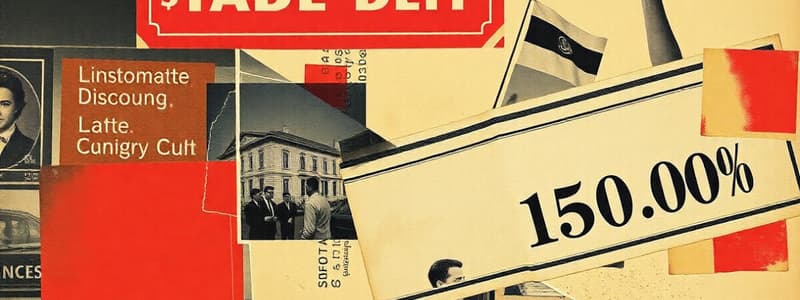Podcast
Questions and Answers
When Company A purchases inventory on credit and receives a trade discount from the supplier, how should Company A record the purchase?
When Company A purchases inventory on credit and receives a trade discount from the supplier, how should Company A record the purchase?
- Record the purchase at the gross cost before the discount.
- Record the purchase by debiting cash and crediting purchases.
- Record the purchase at the invoiced amount (gross cost minus discount). (correct)
- Record the purchase by debiting trade payables and crediting purchases.
What is the primary difference between a trade discount and a settlement discount?
What is the primary difference between a trade discount and a settlement discount?
- Trade discounts are offered for early payment, while settlement discounts are offered for large order volumes.
- Trade discounts affect only the sales price, while settlement discounts only affect the purchasing price.
- Trade discounts are deducted from the cost of purchases, while settlement discounts are never deducted.
- Trade discounts are a reduction in the amount demanded, while settlement discounts are for immediate or quick payment. (correct)
Company B sells inventory on credit to Customer A and offers a trade discount. At what amount should Company B report the sales for the period?
Company B sells inventory on credit to Customer A and offers a trade discount. At what amount should Company B report the sales for the period?
- At the invoiced amount after deducting the trade discount. (correct)
- At the gross sales price before the trade discount.
- Sales should not be reported until the invoice is paid.
- Sales should be reported at both gross and net amounts.
Which of the following best describes how a settlement discount taken by a customer should be recorded by the seller, assuming the seller initially did not expect the customer to take the discount?
Which of the following best describes how a settlement discount taken by a customer should be recorded by the seller, assuming the seller initially did not expect the customer to take the discount?
Company A buys goods from Company B with terms that include a settlement discount for payment within 14 days. Company A chooses not to pay within 14 days. How does this decision primarily impact Company A?
Company A buys goods from Company B with terms that include a settlement discount for payment within 14 days. Company A chooses not to pay within 14 days. How does this decision primarily impact Company A?
When accounting for settlement discounts allowed, what is the initial consideration a business must make according to IFRS 15?
When accounting for settlement discounts allowed, what is the initial consideration a business must make according to IFRS 15?
Company S sells goods to Company T for $100 with a 5% settlement discount for early payment. Company S expects Company T to pay early. What is the initial journal entry Company S will make?
Company S sells goods to Company T for $100 with a 5% settlement discount for early payment. Company S expects Company T to pay early. What is the initial journal entry Company S will make?
A business offers a settlement discount to a customer but the customer does not pay within the discount period. Later, the customer remits the full invoice amount. How should the business record the additional amount received?
A business offers a settlement discount to a customer but the customer does not pay within the discount period. Later, the customer remits the full invoice amount. How should the business record the additional amount received?
Why do most businesses offer credit terms to their customers instead of requiring immediate cash payment?
Why do most businesses offer credit terms to their customers instead of requiring immediate cash payment?
What is the primary purpose of a business establishing a credit limit for its customers?
What is the primary purpose of a business establishing a credit limit for its customers?
What does an aged trade receivables analysis primarily indicate to a business?
What does an aged trade receivables analysis primarily indicate to a business?
A business determines that a customer's debt is unlikely to be paid. How should the business account for this debt?
A business determines that a customer's debt is unlikely to be paid. How should the business account for this debt?
Mumble Company sells goods on credit for $4,000 with terms of 30 days but offers a 10% discount if paid within 10 days. Mumble expects the customer to take the discount. What amount should Mumble record as the initial sale?
Mumble Company sells goods on credit for $4,000 with terms of 30 days but offers a 10% discount if paid within 10 days. Mumble expects the customer to take the discount. What amount should Mumble record as the initial sale?
Soft Supplies Company purchased 10 printers at $200 each, receiving a 10% trade discount and a 5% settlement discount. If payment is made within 14 days, what is the total amount of the settlement discount received?
Soft Supplies Company purchased 10 printers at $200 each, receiving a 10% trade discount and a 5% settlement discount. If payment is made within 14 days, what is the total amount of the settlement discount received?
Freddie sells merchandise on credit for $6,000 with a 10% settlement discount if paid within 10 days. The customer always takes the discount, but this time pays on day 16. What entry does Freddie make to record cash receipt?
Freddie sells merchandise on credit for $6,000 with a 10% settlement discount if paid within 10 days. The customer always takes the discount, but this time pays on day 16. What entry does Freddie make to record cash receipt?
Company X sells goods on credit to Company Y for $500, offering a 5% discount for early payment, but does not expect Company Y to take the discount. If Company Y ultimately does not pay early, what journal entry is made?
Company X sells goods on credit to Company Y for $500, offering a 5% discount for early payment, but does not expect Company Y to take the discount. If Company Y ultimately does not pay early, what journal entry is made?
Given a customer credit sale recognized before cash receipt, what challenge can arise if the customer fails to pay within the allowed period?
Given a customer credit sale recognized before cash receipt, what challenge can arise if the customer fails to pay within the allowed period?
A company offers credit facilities to customers. Which of the following is a potential cost associated with offering these credit facilities?
A company offers credit facilities to customers. Which of the following is a potential cost associated with offering these credit facilities?
Why is a business's decision to take or not take a settlement discount considered a matter of financing policy?
Why is a business's decision to take or not take a settlement discount considered a matter of financing policy?
What are Trade discounts received?
What are Trade discounts received?
How do you calculate trade discounts?
How do you calculate trade discounts?
What are trade discounts allowed
What are trade discounts allowed
Trade discounts received are included in the cost of purchases?
Trade discounts received are included in the cost of purchases?
Settlement discounts allowed are deducted from revenue if the business expects the customer to pay within the agreed period
Settlement discounts allowed are deducted from revenue if the business expects the customer to pay within the agreed period
What is variable consideration?
What is variable consideration?
When there is a settlement discount involved, how the sale will be recorded will depend on whether or not the business believed the customer will pay early
When there is a settlement discount involved, how the sale will be recorded will depend on whether or not the business believed the customer will pay early
Flashcards
What is a Trade discount?
What is a Trade discount?
A discount on a product if bought in bulk.
What is Settlement / Cash discount?
What is Settlement / Cash discount?
A reduction in the amount payable to the supplier for early cash payment.
Trade discounts received effect on cost?
Trade discounts received effect on cost?
Deducted from the cost of purchases.
How Purchase costs are stated?
How Purchase costs are stated?
Signup and view all the flashcards
How are Trade discounts allowed accounted?
How are Trade discounts allowed accounted?
Signup and view all the flashcards
What are Irrecoverable debts?
What are Irrecoverable debts?
Signup and view all the flashcards
What's the benefit of credit terms?
What's the benefit of credit terms?
Signup and view all the flashcards
Why credit control?
Why credit control?
Signup and view all the flashcards
Study Notes
- A customer might receive a price of $1 per unit, but only $0.95 if they get over 100 units
- Regular customers are often offered a discount on all goods they buy due to the large volume of purchases over time.
- Settlement discount (or cash discount) is a reduction in the amount payable to the supplier for immediate payment in cash or quick payment within an agreed period.
- Example: A supplier charges $1000 but offers a discount of 5% for payment within 10 days.
Accounting for Discounts
- Trade discounts received are deducted from the cost of purchases.
- Settlement discounts received are deducted from the cost of purchases and a finance cost will be shown if the business does not pay within the agreed period.
- Trade discounts allowed are deducted from the full sales price and this amount is invoiced to the customer.
- Settlement discounts allowed are deducted from revenue if the business expects the customer to pay within the agreed period.
- Sales tax is ignored as the interaction of discounts and sales tax will not be tested.
Trade Discounts
- Trade discount is a reduction in the money demanded from a customer.
- If a business gets a trade discount for goods purchased, the money demanded will be net of discount (normal sales value less the discount).
- If a business allows a trade discount for goods sold, the money demanded will be after deduction of the discount.
- Trade discounts received are deducted from the gross cost of purchases so the cost of purchases is stated at gross cost minus discount (the invoiced amount).
- Example: Company A buys inventory from Supplier B at a gross cost of $100 and receives a 5% trade discount. Company A will record Purchases $95 (Dr.) and Trade payables control account $95 (Cr.).
- Trade discounts allowed are deducted from the gross sales price, so sales for the period will be reported at their invoiced amount.
- Company B sells inventory to Customer A at a gross sale price of $100, offering a 10% trade discount. The double entry for the sale is Trade receivables control account $90 and Income $90 (Cr.).
Settlement Discounts Received
- If a business can take advantage of a settlement discount, deciding whether to take it is a matter of financing policy, not trading policy.
- Company A buys goods from Company B, allowed a credit period before paying and has a sale date of 1 July 20X6, a allowed credit is 30 days, invoice price of $2000
- The settlement discount offered is 4% payment within 14 days. Company A can either hold on to the money for 30 days, pay the full invoice of $2000
- If the business pays $2000 less 4% ($1920) within 14 days it is a financing decision about whether it is worthwhile to save.
- In the purchases account, the cost of purchases will be recorded at the net amount of $1920.
- If Company A pays within the agreed time, the payment of $1920 is Trade Payables Control Account $1,920 (Dr.) and Cash $1,920 (Cr.).
- If Company A doesn't pay within the agreed time, and pays $2000 the journal entry is Trade payables control account $1,920 (Dr), Finance cost $80 (Dr), Cash $2,000 (Cr.).
Recording of Settlement Discounts Received
- When a business is offered a settlement discount, they record the transaction at the net value using journal entry to pay supplier invoice with $100 full price: Purchases $90 (Dr.) and Trade payables control account $90 (Cr.).
- If the business decides to pay after the agreed payment date, a finance cost will be as follows: Trade payables control account $90 (Dr), Finance cost $10 (Dr), and Cash at bank $100 (Cr.).
Settlement Discounts Allowed
- When a business allows settlement discounts, they need to apply IFRS 15 Revenue from Contracts with Customers to determine the amount at which to record the sale and decide if they expect their customer to take up the settlement discount.
Accounting for a settlement discount when the customer is expected to take up the offer
- The sale will be recorded net of the settlement discount as this is the amount they expect to receive as revenue.
- Company S sells goods on credit to Company T for $100 and offers a 5% discount for paying early. Company S expects Company T to pay early, this will be recorded as Trade receivables control account $95 and Sales $95 (Cr.).
- Company S receives $95 as Company T pays early: Cash $95 (Dr) and Trade receivables control account $95 Cr.
- If the customer pays late for $100 they will not be entitled to the settlement discount Journal entries are Cash $100(Dr), Trade receivables control account $95 (Cr.), and Sales $5 (Cr.).
- Mumble sells goods on credit to a customer for $4000 on 30 day credit terms, but offers a 10% discount if they pay within 10 days and expects the customer to pay within 10 days.
- Mumble will record revenue at $3600 Cash $3 600(Dr.), and Trade receivables control account $3 600 (Cr.)
Accounting for a settlement discount when you do not expect the customer to take up the offer
- Settlement discount will be ignored and the sale will initially be recorded at the full amount (they expect to receive as revenue)
- Company X sells goods on credit to Company Y for $500 and offers a 5% discount for paying early and doesn't expect them to pay this what to journal: Trade receivables control account $500 (Dr), Sales $500(Cr)
- If Company X receives $500: Cash $500(Dr.), and Trade receivables control account $500 (Cr.)
- If the customer pays early they get cash of $475 ($500 × 95%), the cash received will be: Cash $475 (Dr.), and Trade receivables control account $475. Company X needs to account for the settlement discount, and makes the adjustment: Sales $25 (Dr), Trade receivables control account $25.
- Company M sells goods on credit to Company T at a price of $5000 and offers a 10% discount for paying within 10 days however does not expect Y to take up the discount.
- Company M should record the initial sale at $5000 as that is the amount they expect to receive: Trade receivables control account: $5,000(Dr), Sales $5,000(Cr)
- Company T pays after the 10 days, recorded with Cash $5,000 (Dr), Trade receivables control account $5,000 (Cr)
Recording of Settlement Discounts
- The business needs to decide whether they expect the customer to take up the offer of a settlement discount and then deduct the discount from the invoiced amount when recording the sale.
Irrecoverable Debts
- Irrecoverable debts are specific debts owed to a business that it decides are never going to be paid and are written off as an expense in the statement of profit or loss.
- Most buy and sell to one another on credit terms which allows businesses to keep trading without cash immediately, so offering credit terms to customers.
- Revenue for a credit sale is recognized before cash is received, so it may result in problems if do not pay within the time allowed, and use credit control to solve.
- A customer will be given a credit limit, which cannot be exceeded.
- Credit control is the aged trade receivables analysis shows how long invoices have been unpaid and indicate that a customer is unable to pay.
- The costs of offering credit facilities to customers include interest, costs of trying to obtain payment, and court costs.
- An irrecoverable debt is a debt that is not expected to be paid.
Studying That Suits You
Use AI to generate personalized quizzes and flashcards to suit your learning preferences.




